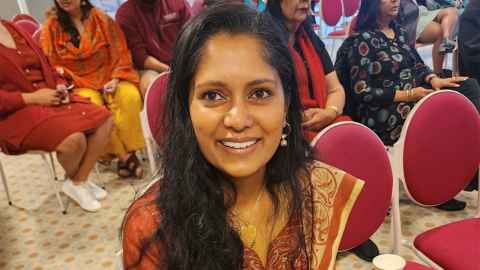Take 10 with... Pritika Narayan
Pritika Narayan, research fellow in the Department of Statistics and School of Biological Sciences, gives us 10 minutes of her time to discuss her research into equity for global majority groups in genome-based medicine.

1. Describe your research topic to us in 10 words or less.
Equity in genome-based medicine for ethnic communities.
2. Now explain it in everyday terms!
Since the first human genome sequence was completed in 2003, many thousands of genomes have been sequenced and many critical genes have been identified that drive the development of disease. Yet 85% of all published genomes still represent only 16% of the world’s population – people with European ancestry. If we do not invest in better representation of ethnic communities in genetic studies, these ethnic communities will never be able to access medicines that are personalised and optimised to their genetic makeup, and they will continue to have the greatest adverse effects and experience major health inequities. My research and advocacy efforts are focused on changing that reality in Aotearoa and further afield.
3. Describe some of your day-to-day research activities.
My day-to-day activities always vary. I talk to stake holders, consult with community leaders and iwi-partners, and meet with team members and collaborators. I learn from other researchers through webinars, lectures, meetings, and symposia, and through the exchange of knowledge with students. I spend a lot of time on advocacy by presenting updates to academics, community audiences, and government officials. I also organise community meetings to discuss ways to engage and collaborate that are culturally appropriate and fun. Some days I do a lot of number crunching, make graphs and illustrations, and write reports and manuscripts. I often spend time writing applications for grants too. A huge part of being equitably compensated, particularly as woman and people of colour, requires learning how to ask for money.
4. What do you enjoy most about your research?
Giving back to community and building relationships with people who inspire and challenge me to excel in this space, so that we can all live healthier lives.
5. Tell us something that has surprised or amused you in the course of your research.
What surprises me is that a lot of research leaders that made it big by asking left field questions and taking major risks, in time become the naysayers. A reoccurring statement said to me is ‘if your research was so important, someone would have done it already’. Yet, I’m confident that there are very few people who bring with them my ancestry, cultural lens, historical perspective, and academic background to ask the same questions I’m asking in the context of Aotearoa before.
6. How have you approached any challenges you’ve faced in your research?
Discrimination and abuse I have experienced in university settings has been challenging and has led to major anxiety for me. It is important to safeguard yourself in these contexts. One of the ways I do this is by writing it down or debriefing with someone. That way I can put a safety plan in place and be better prepared with an ally by my side in future. A book that helped me overcome imposter syndrome was What colour is your parachute? by Richard Nelson Bolles. It helped me align my identity, values, and skills with the larger body of work I want to be part of. An integral part of that journey has been delving deeper into my own whakapapa, how it was severed when my Girmit ancestors were trafficked to Fiji during the indenture and the ongoing repercussions of the indenture on the health of future generations.
7. What questions have emerged as a result?
Who do you let into your waka? Who will navigate obstacles and help you troubleshoot? Who will impart wisdom and pass on knowledge? Who will you choose to listen to? Trust and relationship are at the core of this work. Without listening to the community, it is impossible to change the systems and structures that continue to oppress them. I always want to think about how I can use my skills, energy, and influence to prop up their voices.
8. What kind of impact do you hope your research will have?
One that has lasting and transformative impacts in raising awareness and effecting change in health access, delivery, policy, and practice, at a whānau, hapū, iwi and whenua level, with a particular focus on indigenous and ethnic communities.
9. If you collaborate across the faculty or University, or outside the University, who do you work with and how does it benefit your research?
Collaboration is a huge part of what I do. For example, I work with iwi partners, such as the Moko Foundation and Ngati Whatua, on proposals. I work closely with the Girmit community in several ways, including ImpactDev 360, the Fiji Girmit Foundation New Zealand (Auckland and Wellington chapters), Kaise Hai Aotearoa, and Wellington Fijian Language Class. I also work with Heart Health Advocates at the Heart Foundation to offer free heart health checks at community events. I also collaborate with university colleagues at the University of Auckland, as well as the University of Otago and the National Institute of Biomedical Genomics India. Finally, I work with District Health Boards, the Ministry of Health, and Department of Statistics to get access to data and in turn evidence-based change in policy and practise.
10. What one piece of advice would you give your younger, less experienced research self?
Don’t try to blend in. Celebrate your difference and diversity. Practising difference of opinion and diversity of thought is crucial to generating hypotheses and then setting out to test them. Being from a culture where this isn’t actively encouraged need not hold you back. Seek out mentors who will challenge, inspire, and bounce ideas around with you. Often these people might look like you too. Even if they are rare in places of leadership within universities, they are around, just look a little harder.